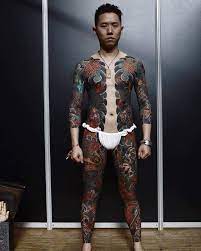
Tattoos are an integral part of Yakuza culture. Their intricate Tattoos reflect Samurai values such as faithfulness, hard work, and perseverance.
The Placement of Yakuza Tattoos
Tattoos are typically placed on the chest, shoulders, back, and arms of Yakuza members. They often hide the Tattoos with clothing, mostly on their backside.
Meaning of Koi Fish Tattoos
Koi fish tattoos are famous among Yakuza tattoos. They symbolize luck, fortune, strength, and perseverance. These fish are known for their ability to swim up waterfalls against the current, representing perseverance in Japanese folklore.
Tattoos of Female Yakuza Members
Though most female Yakuza members do not participate in illegal operations, they still play an essential role. They handle funds, settle disputes, and provide emotional support. Many choose tattoos that reflect their strength and courage, often placed on their chests, calves, or arms.
Symbolism of Showa Sanshoku Tattoos
Showa Sanshoku Tattoos are beloved Yakuza symbols. They depict a black koi fish with white and red markings. This variety has six subvarieties, including the Kin-Kikokuryu, a hybrid between an Ogon and a wild carp with metallic scales.
Meaning of Namakubi Tattoos
Namakubi tattoos may seem shocking, but they represent more than just death and violence. They serve as a reminder to cherish life and every moment it offers.
Traditional Japanese Tattooing
Traditional Japanese tattooing was done using a metal or wooden rod called Tebori. Today, tattoo machines are used instead for quicker application of designs.
Meaning of Irezumi Tattoos
Yakuza body Tattoos are a way for members to set themselves apart and show commitment to their gang. In the past, full-body tattoos were done using a technique called Irezumi. Today, tattoo artists use machines for faster application. The motifs chosen embody Samurai philosophy, like courage represented by the Koi fish, wisdom by the Dragon, and strength by the Tiger.
The Symbolism of Phoenix and Peony Flower Tattoos
The phoenix symbolizes renewal and rebirth, while the peony flower represents abundance and dignity. Both tattoos are used to represent renewal and rebirth. Peony flowers are also considered symbols of femininity and are used extensively on Japanese flags.
Yakuza Tattoos as a Form of Rebellion
As a form of rebellion against discrimination and government authority, Yakuza members developed their tattooing ritual. They preferred motifs like dragons, carp, and tigers, representing courage, wisdom, and strength. These tattoos were easily concealed under clothing.
Fascination with Yakuza Body Tattoos
Yakuza body tattoos have long fascinated people worldwide due to their mysterious allure and challenging tattooing technique. They represent power and mystery, serving as Japanese criminal underground culture examples.
Symbolism of Maple Leaf Tattoos
Men of the Yakuza tattoo maple leaves onto their thighs, arms, or shoulders. The leaves symbolize the entanglement of life and time. Black leaves often represent ancestors, with darker colors and ink associated with more substantial meaning and symbolism. Some Yakuza members accompany the tattoo with an original poem, “Momiji no koto, ” demonstrating their loyalty and dedication.

